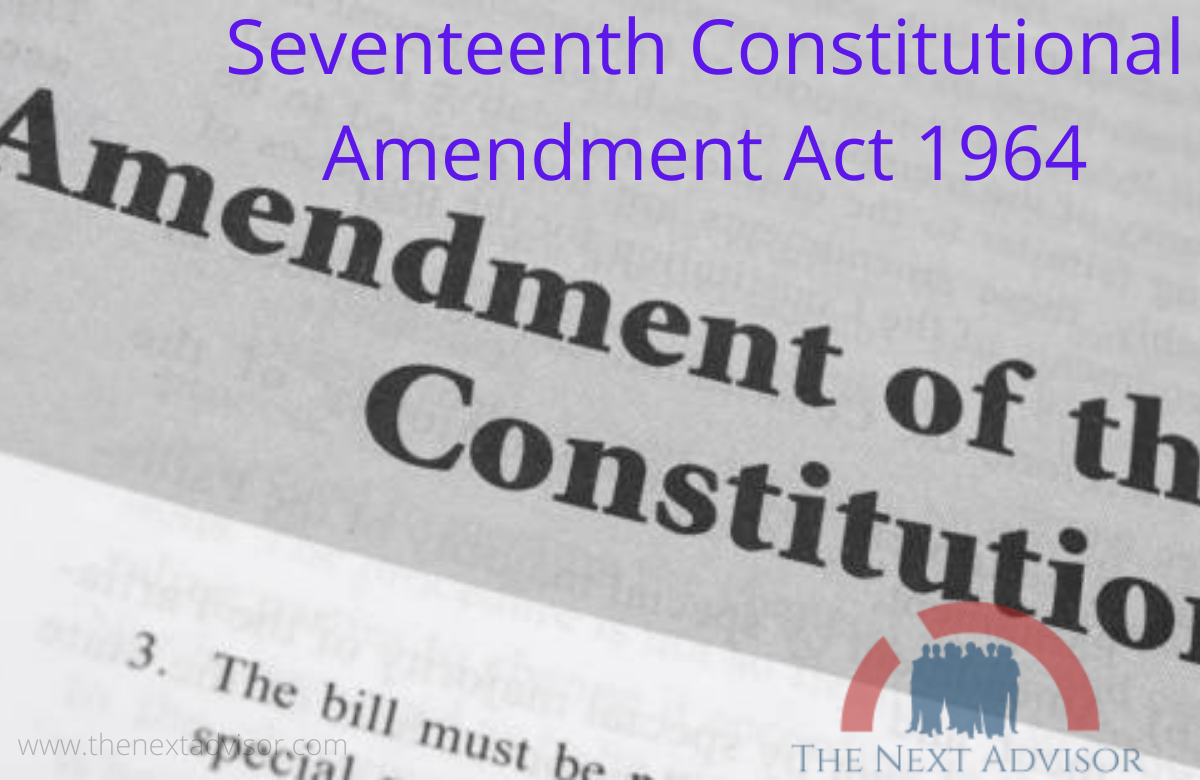The seventeenth Constitutional Amendment Act 1964 is the same amendment that was challenged in I.C. Golakhnath Vs. The State of Punjab. After this challenge came the landmark judgment, in which the Supreme Court said that the Fundamental Rights are non-amendable.
Supreme Court held that Fundamental Rights cannot be amended by the Parliament. Simultaneously, through this amendment, the government further limited the Right to property. Means to the Seventeenth Constitutional Amendment Act of 1964, the government took away more property rights from the people.
STATEMENT OF OBJECTS AND REASONS of Seventeenth Constitutional Amendment Act 1964
In the First amendment, Kameshwar Prasad’s case came in Patna High Court. In order to make it nullified, the Parliament had to make an amendment and say that, Article 19(f) is not a completely absolute right. With this, Article 31 A inserted in the Constitution with the Ninth schedule.
Article 31A of the Constitution provides that law in respect of the acquisition by the State of any estate or of any rights therein or the extinguishment or modification of any such rights shall not be deemed to be void on the ground that it is inconsistent with, or takes away or abridges any of the rights by article 14, article 19 or article 31.
Many of the land reform enactments relate to lands that are not included in an estate. Several State Acts relating to land reform were struck down on the ground that the provisions of those Acts were violative of articles 14, 19, and 31 of the Constitution and that the protection of Article 31A was not available to them.
• It is, therefore, proposed to amend the definition of ” estate ” in article 31A of the Constitution by including therein, lands held under ryotwari settlement and also other lands in respect of which provisions are normally made in land reform enactments.
• the expression ” estate ” shall, in relation to any local area have the same meaning as that expression or its local equivalent has in the existing law relating to land tenures in force in that area and shall also include
( i ) any jagir , inam or muafi or other similar grant and in the States of Madras and Kerala, any janmam right;
( ii ) any land held under ryotwari settlement ;
(iii) any land held or let for purposes of agriculture or for purposes of ancillary thereto, including waste land, forest land, land for pasture or sites of buildings and other structures occupied by cultivators of land, agricultural laborers, and village artisans ;
Seventeenth Constitutional Amendment Act 1964
Prohibition of the acquisition of land under personal cultivation unless the market value of the land is paid as compensation.
Included 44 more Acts in the Ninth Schedule.
The Golaknath Vs State of Punjab 1967
• Further, the petitioner contended that the fundamental rights enshrined under part III of the constitution cannot be taken away by the parliament. ( U / A 19 ( 1 ) ( f )
• They are the essential and integral part of the constitution without which the constitution is like a body without a soul.
• The petitioner also argued that Article 368 of our constitution only defines the procedure for amending the constitution.
• It does not give the power to the parliament to amend the constitution.
Golaknath Vs State of Punjab 1967
Supreme Court held that Parliament could not amend Fundamental Rights, and this power would be only with a Constituent Assembly. 03.
• The Court held that an amendment under Article 368 is ” law ” within the meaning of Article 13 of the Constitution and therefore if an amendment ” takes away or abridges ” a Fundamental Right by Part III, it is void.
• Therefore, to save the democracy from an autocratic action of the parliament the majority held that parliament cannot amend the fundamental rights enshrined under Part III of the Constitution of India
• The majority said that fundamental rights are the same as natural rights. These rights are important for the growth and development of a human being.
In Response to it, Parliament
• The 24th Amendment Act, 1971 compliant with Articles 13 and 368.
• It declared that the Parliament has the power to abridge or take away any of the Fundamental Rights under Article 368 and such an Act, will not be law under the meaning of Article 13.
Also, Made it compulsory for the President to give his assent to a Constitutional Amendment Bill.
• The 25th Amendment Act, 1972, Restricted property rights and compensation in case the state takes over private property

























